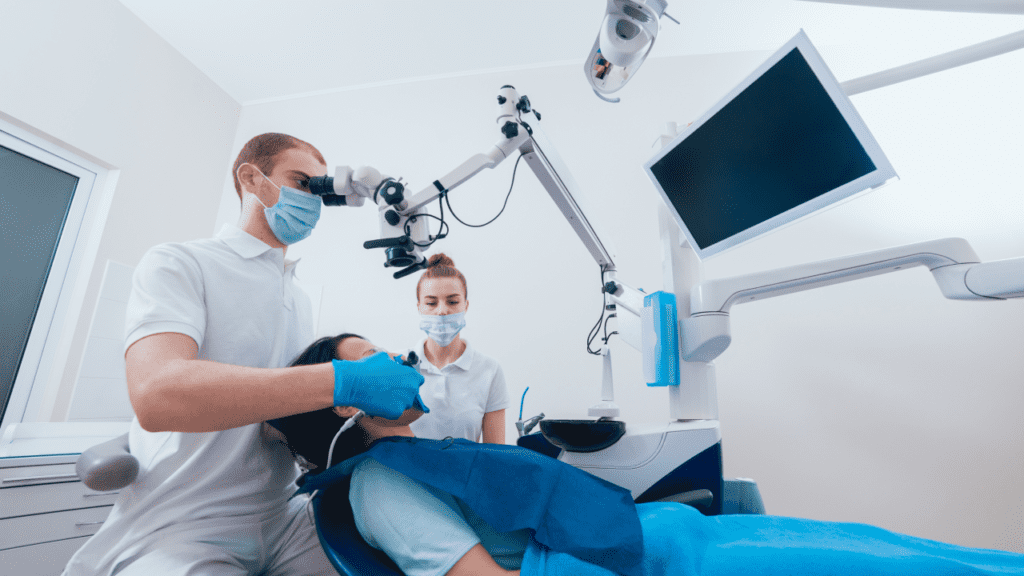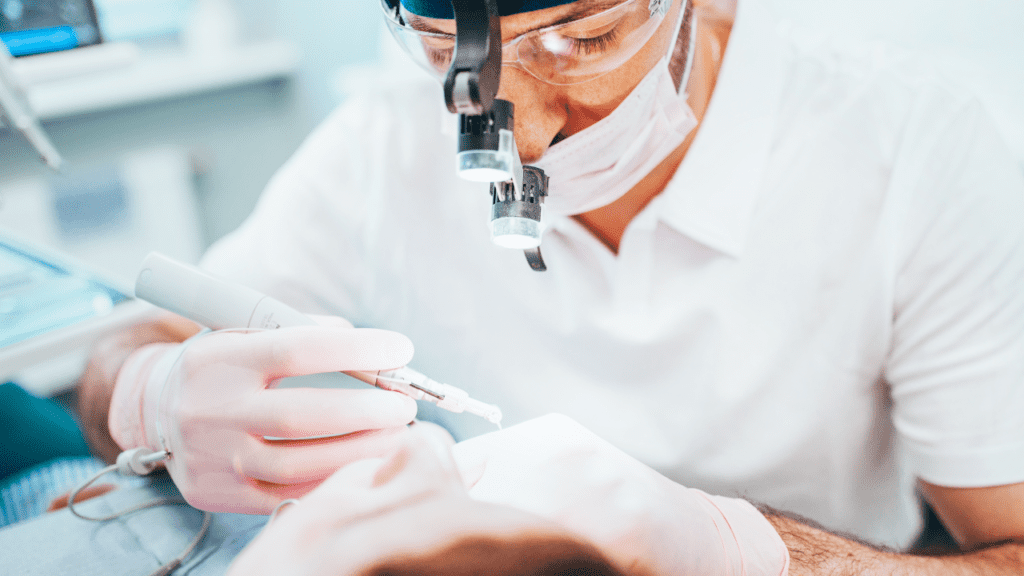Wisdom teeth, also known as third molars, are the last teeth to emerge from the gums. They usually appear in the late teenage years or early adulthood, but sometimes they can develop much later. In some cases, wisdom teeth never fully emerge from the gum tissue.
The average person has four wisdom teeth, two on each side of the mouth behind the last molars. Wisdom teeth usually erupt at an angle of 45 degrees or more beneath the gum line. This may cause them to erupt into other structures in your mouth, such as molars, roots, and nerves, making them impacted.
Wisdom teeth removal is necessary when they’re impacted – meaning they aren’t fully erupted into their proper positions – which happens in about half of all people who have them. Impacted wisdom teeth can cause problems because they are trapped beneath your gums and can’t be easily removed with a toothbrush and floss. They may also develop abscesses or cysts if left untreated and become infected by bacteria in your mouth. In this article, we’ll cover informative content about wisdom teeth and the procedure of removing them.
How Long Does Wisdom Teeth Removal Take Per Tooth?
When your wisdom teeth are removed, it can take anywhere from 30 minutes to several hours. The length of time depends on whether you have any other wisdom teeth removal procedures.
If your wisdom tooth comes in straight, the dentist may be able to extract it in one visit. If it’s impacted or angled, you may need multiple visits to help reduce pain and swelling.
As with any surgery, other factors affect the duration, including:
- The number of teeth involved
- Whether or not you have had previous dental work done
- Your oral health and general health status
- The type of anesthesia used (if any)
- Your age
Is Wisdom Teeth Removal a Major Surgery?
Wisdom teeth removal surgery is usually considered minor surgery. Wisdom tooth extraction is usually considered a minor surgery because only one tooth needs to be removed. The procedure will likely occur in your dentist’s office using local anesthesia. Wisdom teeth removal can be challenging, and it’s not uncommon for complications to occur. However, with proper preparation, you can reduce your risk of complications and achieve excellent results.
The most common complications after wisdom teeth removal include bleeding from the surgical site, infection, swelling, and pain. Rarely, nerve damage may occur if the area around the wisdom tooth nerve is accidentally nicked during surgery. Oral surgeons do their best to prevent this by taking imaging prior to surgery so they know exactly where all vessels lie.
You’ll likely be able to talk in a few minutes after having your wisdom teeth removed. However, in the first few minutes, it’s good to limit how much you talk. Your doctor will give you specific instructions about what foods you should eat and when you can resume normal activities. If your doctor has prescribed pain medication after your procedure, it’s important not to take anything until instructed by your dentist or oral surgeon.
Why Are Wisdom Teeth Removed?
People have four wisdom teeth. However, others have fewer when some wisdom teeth fail to erupt. This is called congenitally missing teeth. Wisdom teeth can cause a variety of problems for people who have them. Here are some reasons why your dentist might recommend removing your wisdom teeth.
Damage to Nearby Teeth
Wisdom teeth can cause damage to the other teeth in the mouth if they don’t come out in time. This is because the wisdom teeth are located very close to the rear molars and premolars, which are important for chewing. The wisdom tooth’s roots can grow into these other molars and cause infection or damage them over time if they’re left in the mouth.
Cysts or Tumors
Wisdom teeth that emerge in an abnormal position may have cysts or tumors attached to them, which can cause pain and swell in the jaw area. In some cases, these growths can become cancerous, so it’s best to have them removed by a dentist as soon as possible before they can cause any health problems.
Wisdom Teeth Impaction
Impacted wisdom teeth don’t come out when they’re supposed to do so, during childhood or early adulthood. These wisdom teeth sometimes need surgical removal later in life if they’re causing problems with other teeth or gum tissue around them.
Inflammation and Infection
If a wisdom tooth becomes infected (abscessed), it can cause swelling and pain in the face or jaw. A bad infection might even spread to other parts of your body. An abscessed wisdom tooth needs to be treated right away to avoid more serious complications such as infection that can quickly travel and affect the rest of the body..
The Wisdom Teeth Removal Process
There are many different ways to remove wisdom teeth, with many tools and techniques to choose from. Many of these techniques have benefits and drawbacks, but they are all used when removing a wisdom tooth. Here is the procedure for removing wisdom teeth.
Making an Incision in the Gum Tissues
The first step in tooth removal is making an incision in the gum tissues covering each wisdom tooth. This helps to visualize the position of each tooth and guide your dentist during the procedure.
Removing Bones That Block Access to Teeth Roots
The next step is to remove any remaining bones blocking access to your wisdom teeth’ roots. These are often located under a layer of gum tissue or bone, so it may take a few tries before you can remove them with dental instruments or lasers. This can be done with a scalpel or handpiece depending on how close they are to your jawbone and if they are causing you pain by rubbing against it during chewing.
Dividing the Tooth Into Sections if It’s Easier to Remove in Pieces
If your wisdom tooth is rather large, it may be easier to remove it in sections. Once you’ve determined which tooth will be removed, you can start dividing it into smaller pieces. You can use a dental mirror or small flashlight to see behind your gums and determine where your impacted wisdom teeth are.
Removing the Tooth
Once you’ve located the impacted wisdom teeth, you’ll need to decide how best to remove them from your mouth. If they are small enough, you can remove them with a forceps or similar tool that will allow for minimal damage when removing them from your mouth. However, if they are larger than normal and have become infected, surgery may be necessary to ensure that they don’t get worse while being removed from your mouth.
Cleaning the Site of a Removed Tooth
After a tooth is removed, you may notice it is still attached to its socket. This is because several small nerves and blood vessels run from the ear and jaw to your brain. If these aren’t removed, they can lead to infections and other complications. To clean up any debris that may have been left behind, use an alcohol swab or gauze pad to remove any remaining particles from around the socket. If you have stitches from previous dental surgeries, use an alcohol swab or gauze pad to remove any dried blood from them before applying gauze over them for protection against infection and bleeding.
Stitching the Wounds
To promote healing, it is necessary to stitch the wounds closed. This can be done with dissolvable sutures or ones that need to be removed by the dentist. The stitch must be placed so that it will not pull on the extraction site when you remove your wisdom teeth. Stitches help with healing, avoiding food getting stuck, and hemostasis.
Placing Gauze Over the Extraction Sites
When you start with your wisdom tooth extraction, you will have blood in your mouth and tongue. The gauze should be placed over the extraction sites for about five minutes to prevent bleeding and to help a blood clot form over the wound. The gauze can also be used as a bandage after removing it from the extraction site.
How Should I Prepare for Wisdom Teeth Removal?
Preparing for wisdom teeth removal can be a bit overwhelming. But don’t worry, it is not as bad as it sounds. You can prepare yourself before and after the procedure so you are ready for it. Here are ways you should prepare for wisdom teeth removal.
Do Research
Many people are unaware that they have wisdom teeth until they start experiencing pain or until they notice them. If you need to know whether or not your wisdom teeth need to be removed, then it’s best to do some research first to find out more about your condition and what options are available to you.
Consider Dental Insurance
The first thing that you should do before going to the dentist is to check your insurance coverage. You need to know what is covered by your insurance policy and what isn’t so you don’t end up paying extra money out of your pocket.
Eat Soft Foods
If you are having wisdom teeth removal, then it is recommended that you first get soft foods to chew on after the operation. This will help your jaw and mouth muscles recover faster and more efficiently. Soft foods include fruits, vegetables, nuts, seeds, and other healthy items. You can also drink plenty of water before going to bed at night so that your body can have enough hydration during the recovery process.
Get Enough Sleep
Wisdom teeth extraction can cause pain in your mouth, so rest is needed for recovery. You should also eat well-balanced meals throughout the day to keep yourself going and avoid any complications during your recovery process.
Should You Take Time Off For Wisdom Teeth Removal?
A lot of people ask, “Should I take time off from work for wisdom teeth removal?” It’s a question we get a lot. The answer depends on your situation. If you need to take time off work, you should talk with your dentist and see what they recommend. They can help you decide if you should be able to go back to work right away or if you need longer than usual.
Although the procedure is simple and many people return to work, you can get a few days off. You want to ensure that your body has enough rest and recovery time before getting ready for your surgery.
If you’re getting wisdom teeth removed, you must take care of yourself in the days following the procedure. Your dentist will give you specific instructions on how long each step should take, so follow them closely.
Can I Go Back To Work The Day After Wisdom Teeth Removal?
If you’re not experiencing pain or discomfort and your mouth is fine, you can begin to eat and drink normally. You don’t have to wait for the stitches to completely heal before returning to work – but if you notice any signs of discomfort in your mouth, it’s best to take a few extra days off.
It’s important not to bite down on anything until the stitches are removed, and everything is healed. If there is any bleeding or redness around your mouth, don’t put anything in it until it’s completely healed. The following are some of the ways that you can help speed up your recovery:
Don’t smoke or chew tobacco for at least two weeks after surgery: Smoking increases your risk of infections, bleeding, and other problems after surgery. If you smoke, talk with your dentist about ways to help you quit before your surgery date.
Eat soft foods until your mouth feels normal again (about two weeks): Avoid hot or cold foods; they could cause pain or discomfort in the healing process.
Plenty of water: Drink plenty of water to help reduce swelling and keep food from sticking to the inside of your mouth.
Take the right painkillers: Use only non-alcoholic pain relievers as directed by your doctor or dentist, including acetaminophen (Tylenol) or ibuprofen (Advil). Don’t take aspirin because it can increase bleeding at the surgical site during recovery.
How Much Does Wisdom Teeth Removal Surgery Cost?
The cost of wisdom teeth removal varies depending on the type of procedure performed, your insurance coverage, and the length of treatment time required. This procedure is considered cosmetic surgery and does not require any special coverage. If you have health insurance, your dentist can provide a quote for the procedure once they have reviewed your oral health history and x-rays.
The average cost for wisdom teeth removal is about $75 to $250. This price includes all the necessary materials, procedures, and staff time to remove your wisdom teeth.
Conclusion
In general, wisdom teeth removal is a straightforward surgery that can successfully be completed under local anesthetic in less than an hour. The type of anesthesia will depend on your request and the dentist’s preference. In this post, you’ll learn more about the time wisdom teeth removal takes and how to prepare for it.
Related Articles
What You Should Know About Tooth Extraction Healing White Stuff
Erica Anand is a certified dental expert. She holds a BA in Chemistry and a Doctorate of Dental Surgery from Stony Brook University. After completing a two-year pediatric dentistry program, she now runs a private practice focusing on preventive dentistry and is a member of the American Association of Dental Consultants.
Marcus Ramsey has been a professional writer for over seven years. He has talked about and produced content for industries like Dentistry, Healthcare, and more.






